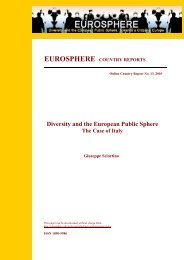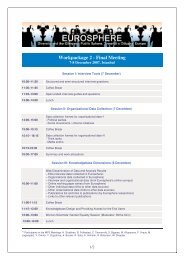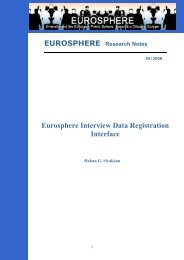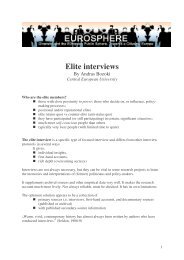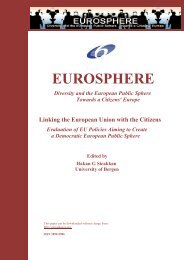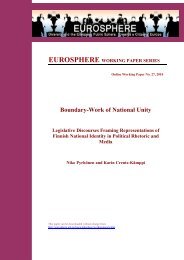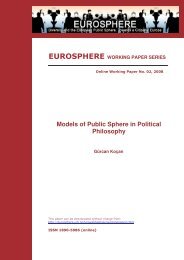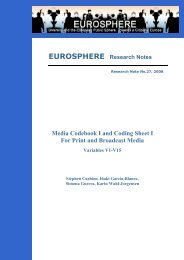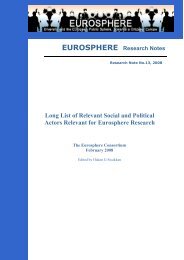Migrants, Minorities, Belongings and Citizenship. Glocalization and ...
Migrants, Minorities, Belongings and Citizenship. Glocalization and ...
Migrants, Minorities, Belongings and Citizenship. Glocalization and ...
You also want an ePaper? Increase the reach of your titles
YUMPU automatically turns print PDFs into web optimized ePapers that Google loves.
“what new norms, institutions, structures <strong>and</strong> policies of citizenship do we need to<br />
reduce/eliminate the misalignments”<br />
3. Further research recommendations<br />
Confronting these new research questions, the way further should include the diversity<br />
analyses of the European society <strong>and</strong> the European public sphere, as Europe is now<br />
unequivocally a diverse society. In this project, one important parameter in realization of<br />
togetherness in diverse societies has been found to be the phenomenon “co-other”,<br />
signifying individuals with a high degree of mobility of mind between different references<br />
of identification. Therefore, any further research on the development of the European<br />
diverse society should incorporate the mobility-of-mind dimension into the analysis.<br />
Furthermore, the class <strong>and</strong> demographic dimensions of citizenship should also be<br />
systematically incorporated into a future research in these lines.<br />
Glocalmig is an exploratory project, <strong>and</strong> its findings relate primarily to “the new” in<br />
Europe <strong>and</strong> the possible impact of “the new” in Europe. The new in Europe is the fading<br />
<strong>and</strong> reshaping of borders <strong>and</strong> boundaries, the possibility of unlimited spatial mobility, <strong>and</strong><br />
the increasing mobility of minds. These are also about the features of “glocal spaces”,<br />
which can be seen as the prototypes of a future European diverse society. Therefore, we<br />
recommend the European Commission to focus more on the European glocal spaces in<br />
order to increase the knowledge about how a diverse society <strong>and</strong> a European public<br />
sphere is possible, how unity/togetherness in diversity can be achieved, <strong>and</strong> how a<br />
diverse society can create <strong>and</strong> manage its own politics without deconstructing itself.<br />
This requires collaborative research actions at the European level with inclusion of all the<br />
EU-member <strong>and</strong> c<strong>and</strong>idate states. In addition to the type of qualitative work done in<br />
Glocalmig, a comprehensive survey is also required to obtain results with high level of<br />
reliability <strong>and</strong> validity in the whole Europe.<br />
4. European added value<br />
Glocalmig is primarily a qualitatively oriented research project. Its design comprises<br />
participant observation, structured, semi-structured <strong>and</strong> unstructured interviews, data<br />
collection from documents using vernaculars, etc. It requires a high level of contextsensitivity.<br />
Therefore, conducting the Glocalmig research activities at the European level<br />
was the only way of achieving the scientific objectives of this project.<br />
From the design of research tools <strong>and</strong> theory building to the data-collection <strong>and</strong> analysis<br />
activities, all stages of the project required an in-depth knowledge of the fieldwork sites,<br />
106



